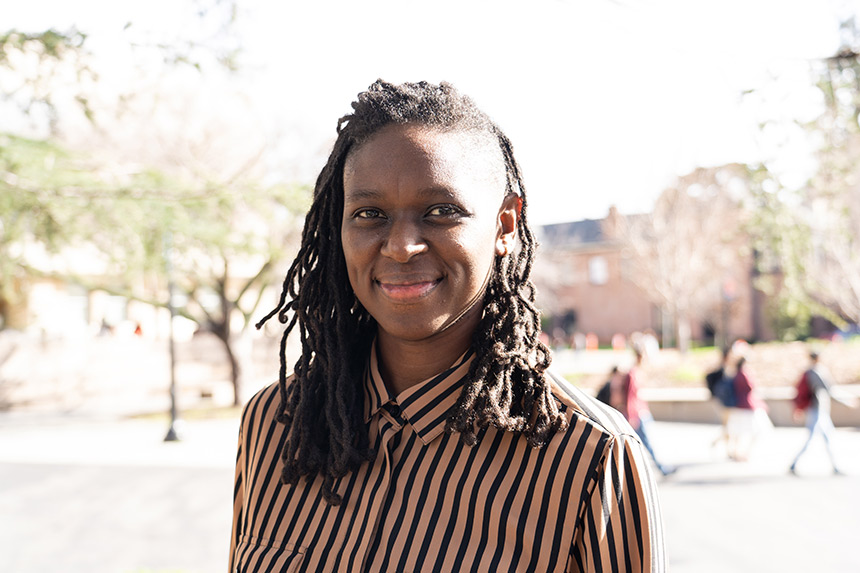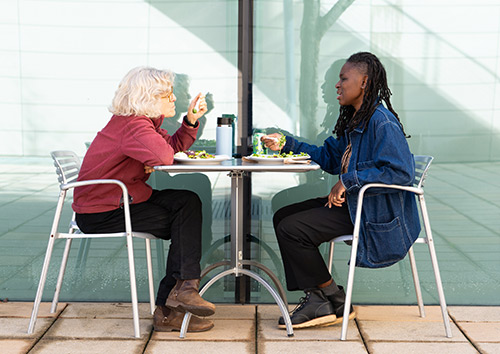
By Gwyneth K. Shaw
When the U.S. Supreme Court overturned Roe v. Wade in June 2022, the impact landed like a rock hitting the surface of a pond: an immediate splash, followed by concentric ripples across the political landscape.
Abortion restrictions — some already in place, ready to be triggered by the fall of Roe, others fast-tracked to passage — came first. Attacks on abortion methods followed, including ongoing litigation over mifepristone.
Emboldened by the Dobbs v. Jackson Women’s Health Organization decision, activists began pushing to curtail or ban gender-affirming care, particularly for children. Leveraging many of the same tactics and legal theories used to target Roe, lawmakers in several states have acted, and some federal courts have upheld these laws.
As the second anniversary of Dobbs approaches, Arneta Rogers has just arrived at Berkeley Law as executive director of the school’s Center on Reproductive Rights and Justice (CRRJ). Rogers, who has forged a stellar career in the reproductive justice movement, knows it’s a pivotal time in the fight to protect bodily autonomy — and is ready for it.
“The reproductive justice movement is home for me, and it’s a challenging time,” Rogers says. “But I feel excited and energized about the opportunity to join CRRJ. With the fall of Roe and the proliferation of harmful and dangerous abortion restrictions throughout the country, there has rightfully been significant emphasis on protecting abortion rights and abortion access. But abortion access is just one prong of the core tenets of reproductive justice, a framework that encompasses the human right to maintain personal bodily autonomy, have children, not have children, and parent the children we have in safe and sustainable communities.
“We have a really broad mandate in terms of what we can address at the center utilizing this lens that also calls on us to dismantle oppressive systems.”

CRRJ Faculty Director and Professor Kathryn Abrams says Rogers, who comes to Berkeley Law from the ACLU of Northern California, most recently as the organization’s Gender, Sexuality, and Reproductive Justice director, is an ideal match.
Rogers has a J.D. from the University of California College of the Law, San Francisco, and led the Positive Women’s Network – USA’s policy advocacy arm before joining the ACLU.
“Arneta’s breadth of vision aligns beautifully with the center’s history and mission,” Abrams says. “Arneta brings more than a decade of experience advocating for the reproductive autonomy and self-determined family formation of communities at the margins, and forging coalitions for change in collaboration with those directly affected, and has also been a skilled and consistent mentor to younger lawyers.”
Rebooting and expanding
CRRJ was founded in 2012 as the first law-school-based interdisciplinary think tank on reproductive issues and a key hub for academics, practitioners, advocates, and activists. But the center’s activities waned when the previous executive director departed and the faculty director finished her term in close succession a decade later.
After Dobbs shook the movement to its core, Abrams teamed with Professor Emerita and center founding director Kristin Luker to boost CRRJ, planning programming and acting as a resource for law students who wanted to take action after the decision.
Now, with Rogers on board, the center can again take a leadership role in California and beyond. Rogers hopes to expand its scope to include other overlapping concerns, from the criminalization of pregnancy to the separation of families, often Black, because of poverty.
As advocates discuss access to reproductive health care as a critical issue, Rogers says, they also need to be talking about keeping families together as a connected goal.
At the ACLU, Rogers advocated for California lawmakers to not just protect abortion rights, but also ensure individuals aren’t investigated, prosecuted, or incarcerated for ending a pregnancy or experiencing a pregnancy loss, clarify that poverty isn’t “neglect” and shouldn’t trigger a mandatory report to the family regulatory system, and take steps to advance birth equity by funding doulas in communities with high rates of negative birth outcomes, including jails.
She also worked to build a coalition of advocates and directly impacted community members working to decriminalize sex work in California.
“I’m looking forward to relaunching a comprehensive and inclusive agenda for CRRJ that centers the experiences and needs of communities on the margins that are bearing the brunt of the harm, not only of abortion restrictions, but in attacks on gender-affirming care, criminalization, punishment, and surveillance through the family regulation system,” Rogers says. “We will elevate the scholarship of BIPOC thought leaders, movement practitioners, and students through the center. Hopefully we can have some really dynamic and intersectional conversations that will help us move the needle forward.”
A home for students
Rogers will kick off programming for the semester on Feb. 20 when CRRJ hosts former ACLU colleague Faride Perez-Aucar for a talk about reproductive health in California jails. Melissa Ayala, who argued the case that decriminalized abortion in Mexico, will make an appearance at a center event in March.
Berkeley Law’s students, some of whom were part of the interview process for the job, have impressed with what Rogers calls their “combustible energy.” Rogers wants to give students a kind of home base where they can cultivate their own analysis of what’s happening, meet and interact with other advocates, and just think creatively about how to meet this moment in the history of reproductive justice.
“I want CRRJ to be a political home for students who are fired up about reproductive justice and rebuking historical and current attacks on the right to bodily autonomy,” Rogers says. “The center can be a place where students can meet and work with other lawyers, advocates, organizers, and individuals with lived experiences to generate ideas and meaningful solutions to the significant challenges we are facing towards achieving reproductive freedom.”
They’re just as eager to work with Rogers.
“It was clear from the earliest moments of our conversation that Arneta was exactly who we needed to lead the center,” says Jordan Hefcart ’25, co-leader of the Reproductive Justice Project, one of the school’s Student-Initiated Legal Services Projects.
Rogers wanted to hear students’ thoughts, Hefcart says, but also brought a “deeply considered menu of ideas for programs and projects that hadn’t even occurred to us to be possible.”
“The only remaining question we had by the end of the conversation was ‘when do you start?’” Hefcart says.